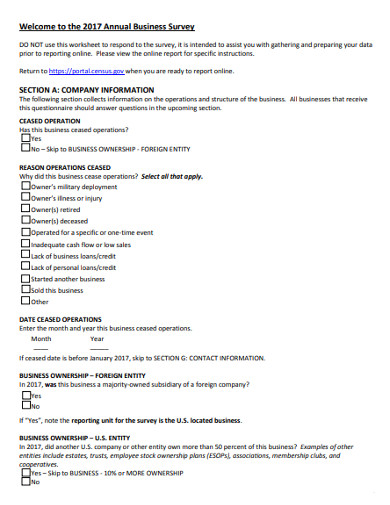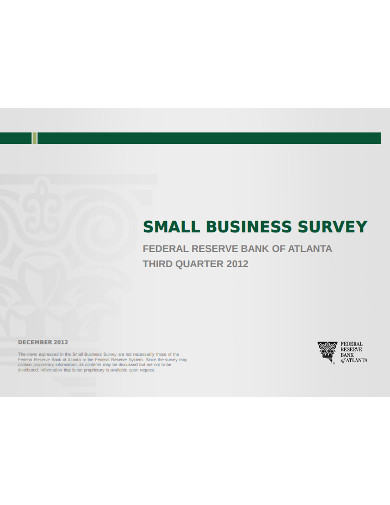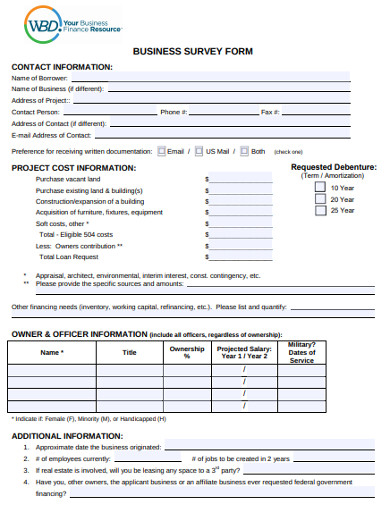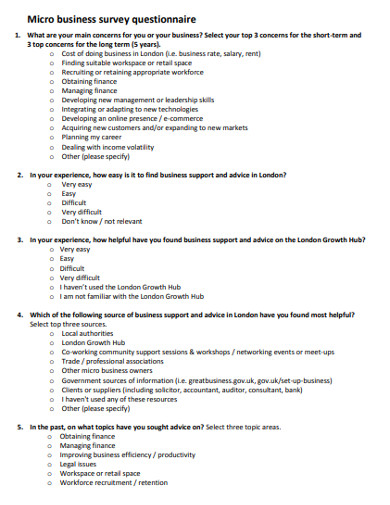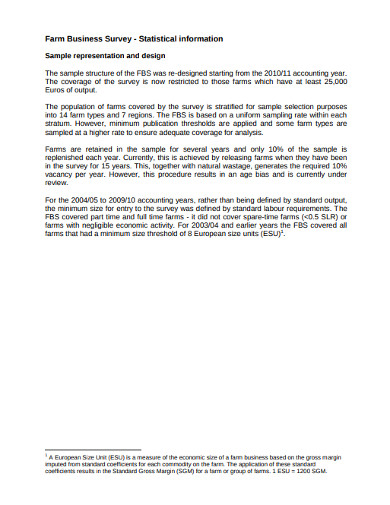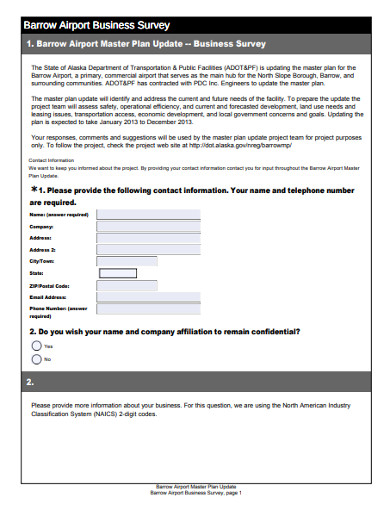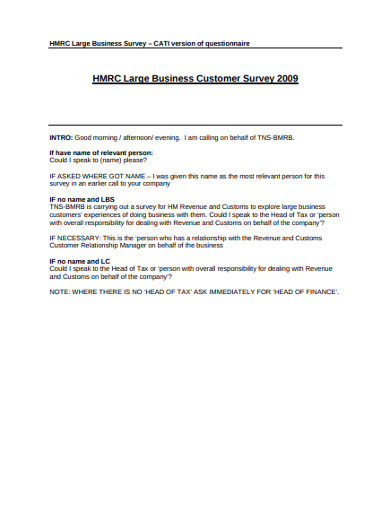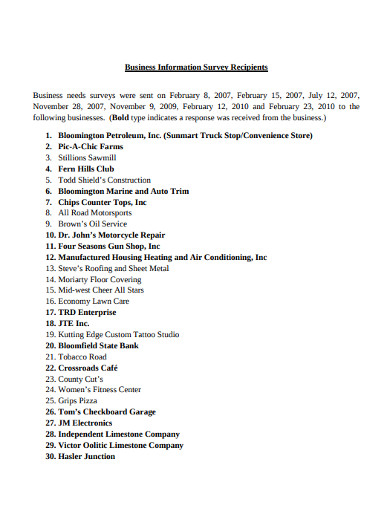16+ Business Survey Examples to Download
A business survey can be defined as a targeted method to gather intelligence about your business, and a way to identify the strengths and weaknesses of your business. To run a business, one needs to have a great deal of information, including information about markets, customers and competitors. One way to get the valuable information you need to keep moving your company – and your profits – forward is to create business surveys to gauge the interests and satisfaction of your customers, which can tell you a great deal about the current status of your company.
Below we are providing 16+ Business Survey Examples & Templates for your benefit.
Business Survey Examples & Templates
1. Business Survey Template
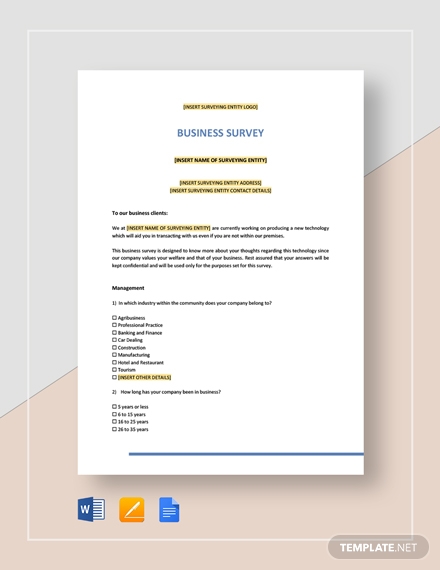
A business survey template is a simple and basic format in which the survey questions are written down for the customers to answer. The format is usually editable for the ease of filling them.
2. Business-to-Business Market Survey Template

This template is used to gauge your client’s pulse and it asks the client if they may hire your services/ products again. The template is simple and is usually made very user-friendly.
3. Survey Questionnaire for Food Business
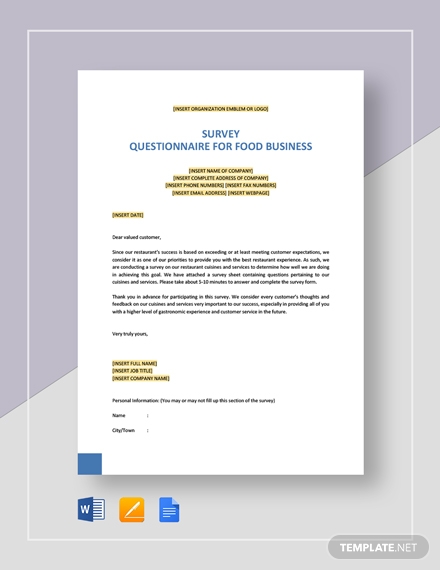
This is a survey that is usually conducted by a restaurant, hotel or catering service to gauge customer satisfaction. The survey forms may be in softcopy in a simple and basic format, and is to be filled by their customers. It helps the restaurant to identify their strengths and weaknesses.
4. Annual Business Survey
The Annual Business Survey (ABS) is a new joint project between the U.S. Census Bureau and the National Science Foundation’s National Center for Science and Engineering Statistics. It will provide statistics on minority-owned business estimations and will measure other business and business owner characteristics such as firms, receipts, payroll and employment by demographic characteristics such as gender, race, ethnicity and veteran status.
5. Future of Business Survey
The Future of Business survey is collaboration between Facebook, the OECD and the World Bank to provide timely insights on the perceptions, challenges, and outlook of online Small and Medium Enterprises (SMEs). The attached template is a free example of the survey, and is downloadable and printable.
6. Business Survey Report
A business survey helps the company to base business decisions on objective information. Conducting a business survey is an unbiased approach to decision-making. A business survey report helps the company make important business decisions without relying on gut feeling. The attached example is a free and basic specimen of the same.
7. Small Business Survey
These surveys are conducted by people who own or work at small business. Small businesses are privately owned corporations, partnerships, or sole proprietorships that have fewer employees and/or less annual revenue than a regular-sized business or corporation. A small business survey is conducted by them to gauge customer feedback and understand market dynamics.
8. Regional Business Surveys
A regional business is a business that is aimed at providing service/ products targeted to a particular region of a country/ state. This above template is a similar free and simple survey that aims at gathering customer feedback and understanding market dynamics to improve business.
9. Business Survey Form
A above sample template is a business survey form and is free, where the business survey questions are written down in a simple and basic template. It is printable, editable and easily downloadable.
10. Small Business Credit Survey
The Small Business Credit Survey (SBCS), a national collaboration of the 12 Federal Reserve Banks, provides timely information on small business financing needs, decisions, and outcomes to policy makers, researchers, lenders, and service providers.
11. Micro Business Survey Questionnaire
This survey is conducted by the owners of a micro business, and is in very basic and simple format. It is aimed at their business customers to identify their business strengths and weaknesses.
12. Farm Business Survey
The Farm Business Survey provides information on the financial, physical and environmental performance of farm businesses. It is free, very simple to understand and in a basic format, which is downloadable and printable.
13. Airport Business Survey
This is conducted usually by a state government or airport authorities to help identify their strengths and weaknesses and thus understand what changes are needed, if any. It is used to improve the business at a particular airport. The survey is free, simple and very basic.
14. Large Business Customer Survey
This is conducted by large businesses and the surveys are filled out by their customers. It is a simple and basic survey, and the form is easily editable, downloadable and printable as well.
15. Business Information Survey Recipients
This type of a survey is done to receive first hand business information. A variety of information may be needed by a company to carry out business effectively and thus it sends the surveys to various organizations.
16. Small Business Survey Report
This is a report that is created by a small business company after a simple and basic survey of its customers, done to understand the strengths and weaknesses of the business.
17. Quarterly Business Survey
A Quarterly business survey is a survey that is conducted every quarter. It is a simple and basic survey which provides a quick assessment of current business trends and expectations for the future.



